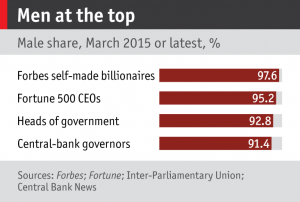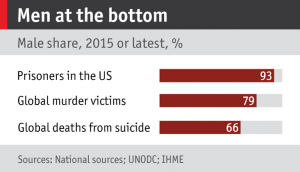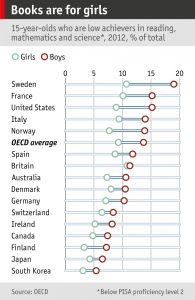The Economist has a feature article on the state of blue collar men in developed countries: Men Adrift. It is good in its statement of facts.
Blue collar men are sinking in the economic scale and are becoming unemployable and unmarriageable. Their future in the new economy does not look good.
Although men dominate at the top of society, they also dominate at the bottom, which is far larger. There are a far more male prisoners than there are male CEO’s.
Men still dominate risky occupations such as roofer and taxi-driver, and jobs that require long stints away from home, such as trucker and oil-rig worker. And, other things being equal, dirty, dangerous and inconvenient jobs pay better than safe, clean ones. But the real money is in brain work, and here many men are lagging behind. Women outnumber them on university campuses in every region bar South Asia and sub-Saharan Africa. In the OECD men earn only 42% of degrees. Teenage boys in rich countries are 50% more likely than girls to flunk all three basic subjects in school: maths, reading and science.
Men are either unemployed or are simply not there.
For every 100 African-American women aged 25-54 who are not behind bars, there are only 83 men of the same age at liberty. In some American inner cities there are only 50 black men with jobs for every 100 black women.
This situation is similar among other groups, if not as extreme.
The Economist admits that
Single motherhood is much better than living with an abusive partner. But the chronic instability of low-income families hurts women, children and men. The poverty rate for single-mother families in America is 31%, nearly three times the national norm. Children who grow up in broken families do worse in school, earn less as adults and find it harder to form stable families of their own. Boys are worse affected than girls, perhaps because they typically grow up without a father as a role model. Thus the problems of marginalised men tumble on down the generations.
The Economist holds Sweden up as an egalitarian model, but admits that Swedish men are not very happy with this situation and that Swedish boys have the hardest time in school of all the countries surveyed.
Disaffected men are attracted to parties of the far right and far left.
The Economist’s solution: men should become more like women.
The Economist, resolutely secular, completely ignores the role of religion.
One of the main motives for men to become a father involved with his family (instead of a stud service) is religious. The Jews alone in the ancient Near East revered the father, and fatherhood remained central to Orthodox Judaism throughout the ages. Christianity and Islam both inherited that centrality. Paul’s epistles tell men they should be loving, affectionate, sacrificial husbands and fathers.
The Reformation and the Counter Reformation both emphasized the role of the father in the family. Today Evangelical Protestantism does the best job of convincing men to be affectionate, involved fathers, what Wilcox calls soft patriarchy: spiritual headship.
The Pew poll on religion showed that the gender situation is the same in the US as other surveys showed in England. The type of person most likely to be involved in church is a middle class, older woman; the type of person least involved was a young, uneducated man.
No doubt economic factors play a role; but they too are affected by religion. Men were given a privileged position in the economy so that they could head and support a family.
Mainline Protestant churches and the Catholic Church show little interest in attracting men, especially young men, especially poor young men. The constituency of these churches is women, and these churches try to keep this constituency happy. Men are an afterthought at best, or even actively discouraged.
When I was in Montreal once about a conference on fatherhood, a sociologist (a woman) presented the data on the increase in suicides among young men in both Canada and other developed countries. Gregory Baum, the liberal theologian, rose from the audience audience to respond; he asked why we wear wasting our time on such a topic, when the real, urgent, overwhelmingly important problem was that there was a glass ceiling in universities that prevented women assistant professors from rising to full professorships, especially in theology – that is what we should be discussing. That seems to be indicative of the attitude of liberal Christians to discussions of male problems.


